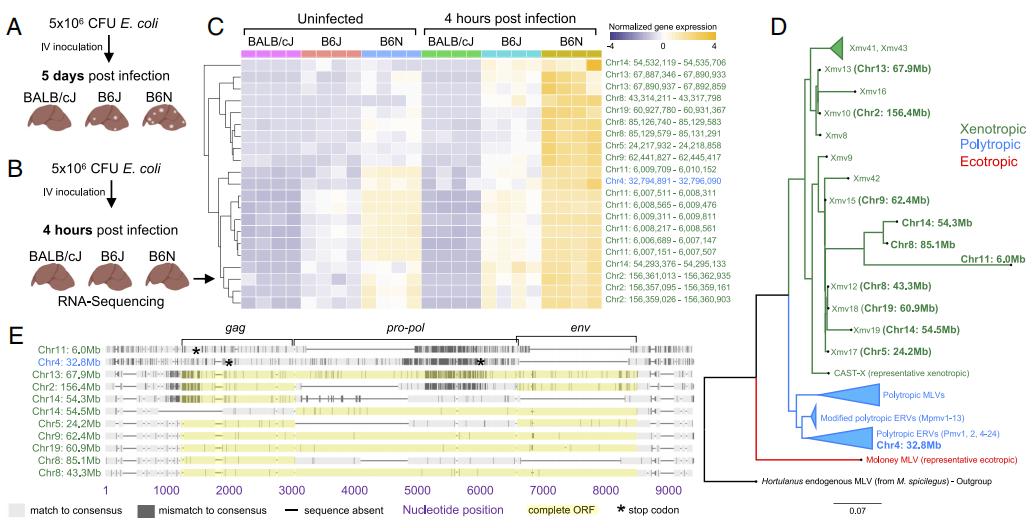Bacterial infections can lead to the formation of abscesses, pockets of dead cells and debris surrounded by inflammatory immune cells. Bacteria can multiply in an abscess and cause more infections, further damaging surrounding tissue. In severe cases, these immune responses can spread throughout the body and eventually cause life-threatening organ failure or sepsis. But how these abscesses form and how to prevent them have not been better understood.
Recently, in a research report titled "Reverse transcriptase inhibitors prevent liver abscess formation during Escherichia coli bloodstream infection" published in the international journal Proceedings of the National Academy of Sciences, scientists from Brigham and Women's Hospital in the United States and other institutions used preclinical models to identify a key mechanism that may drive the formation of liver abscesses, a process called reverse transcription.
Using RNA sequencing technology, the researchers analyzed liver gene transcripts in mice infected with E. coli. They found that abscess formation was associated with increased expression levels of endogenous retroviruses (ERVs). ERVs are viral remnants that have integrated into the mouse genome after past infection. Researchers speculate that the DNA produced by ERVs can stimulate the body's inflammatory immune response, thereby damaging surrounding cells and driving abscess development. If so, blocking the activity of ERVs might prevent abscess formation.
 Figure 1. ERV expression correlates with abscess susceptibility. (Hullahalli K, et al., 2024)
Figure 1. ERV expression correlates with abscess susceptibility. (Hullahalli K, et al., 2024)
To test this, the researchers used reverse transcriptase inhibitors (antiretroviral drugs also used to control HIV infection) to block ERV's DNA expression. It was found that a single dose of the inhibitor cocktail may be enough to prevent abscess formation if given quickly after a bacterial infection. "Our findings suggest that drugs used to treat HIV can also be used to prevent the inflammatory complications of bacterial sepsis," said Matthew Waldor, MD.
| Cat.No. | Product Name | Price |
|---|---|---|
| CDCB156970 | HIV HIV-rev ORF clone (K03455) | Inquiry |
| CDCB156978 | HIV HIV-gag ORF clone (K03455) | Inquiry |
| CDCB156979 | HIV HIV-env ORF clone (U51190.1) | Inquiry |
| CSC-RR0453 | HIV-1 GFP Reporter Cell Line - A3R5 | Inquiry |
| CSC-RR0454 | HIV-1 Luc/GFP Reporter Cell Line - A3R5 | Inquiry |
| CSC-RR0455 | HIV-1 Luc/GFP Reporter Cell Line - A3 | Inquiry |
| CSC-RR0456 | HIV-1 GFP Reporter Cell Line - CEM | Inquiry |
| CSC-RR0457 | HIV-1 Luc/GFP Reporter Cell Line - CEM | Inquiry |
| CSC-RR0458 | HIV-1 Luc Reporter Cell Line - CEM | Inquiry |
| EMTT4002 | HIV Reverse Transcriptase | Inquiry |
| PTAK-030 | HIV-1 Activity Assay Kit | Inquiry |
| PTAK-031 | HIV-2 Activity Assay Kit | Inquiry |
In mice, susceptibility to abscesses varies by sex and tissue. Therefore, researchers will further study to understand how antiretroviral drugs can prevent complications such as bacterial sepsis in different individuals. But the results of this study reveal some hope and point to a new way of thinking about how to treat and prevent harmful consequences of bloodstream infections after they occur.
Taken together, the findings suggest that endogenous reverse transcriptase may drive the inflammatory response during bacterial bloodstream infection, thereby further promoting abscess formation. The highly effective results of nucleoside reverse transcriptase inhibitors (NRTIs) in preventing abscess formation indicate that later researchers need to further analyze the impact of reverse transcription on the body's inflammatory response, especially in infectious diseases where inflammation drives negative clinical outcomes, such as sepsis.
Reference
Hullahalli K, et al. Reverse transcriptase inhibitors prevent liver abscess formation during Escherichia coli bloodstream infection. Proceedings of the National Academy of Sciences, 2024, 121(4): e2319162121.

